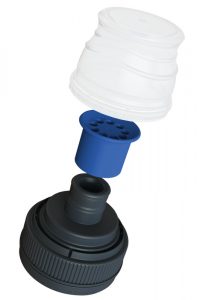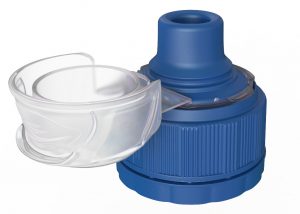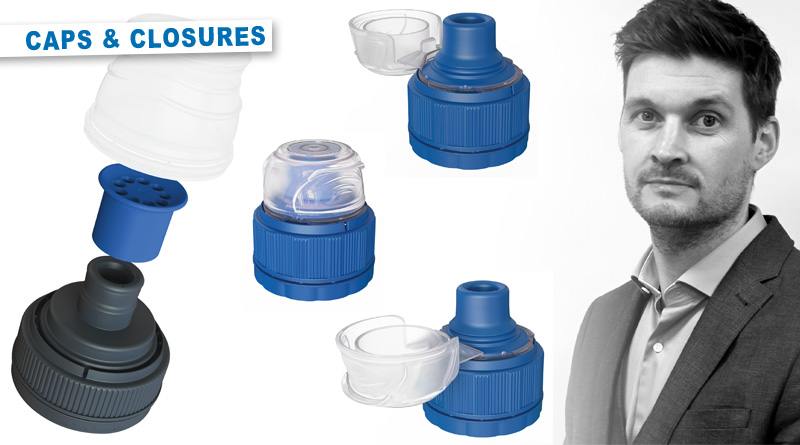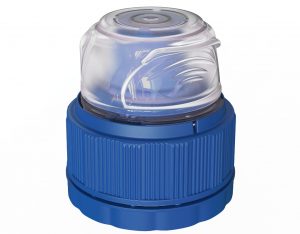Top closers
by Ruari McCallion
Mark Smith, Vice-President and Technical Director of Universal Closures Ltd, talked about the company’s tradition of innovation, the challenges of branching out into new markets and the impact of upcoming legislation on closure system design.
The name may not be immediately familiar to consumers of beverages, whether still or carbonated, or, increasingly, users of health and beauty or homecare products, but its designs and licensed closure systems most certainly will be. Universal Closures Ltd (UCL) is possibly the world’s leading designer of closure systems; it counts giants such as Coca-Cola, Alpla and Srithai Superware among its licensees and clients. They have recently been joined by USA-headquartered Westfall Technik, which includes Mold Craft Inc and AMA Plastics among its subsidiaries. UCL President and Founder, Rod Druitt, has an increasing presence in the United States, working with Westfall Technik and other connections in shaping and developing their market presence.
Mark Smith, Senior Vice-President and Technical Director, took the 90-minute drive from the company’s global HQ in Tewkesbury, England, to meet Ruari McCallion at PETplanet Insider’s representative office in Salisbury, England. He described how UCL is reacting to marketplace demands, meeting the needs of new legislation and rising to the challenges of the post-Covid19 world.
“UCL is a design and development company. We don’t manufacture closures ourselves; we licence our products to manufacturers and producers all over the world,” Mark explained. “We do a lot of work with the primes and collaborate closely with Z-Moulds, the Swiss-based toolmakers.”
Focusing on the core
Licensing its technology and products, rather than making them itself, enables UCL to spread its influence and reputation further than would otherwise be the case, and to focus on what it does best.
“We have 32 licensees currently, across Europe, the USA and Australasia – you know about Coca-Cola Amatil in Australia, who have the Sylon cap under license,” said Smith. “That structure allows us to focus on innovation; not just to react to the market but to get on the front foot and innovate, wherever we see opportunities. That is the core of our business.”
UCL was originally incorporated in 2004 and it has built up quite a library of designs over the years since then, including short caps for PCO1881 neck finishes and the Mercury Sylon three-piece sports closure, which was the first of its type to be made entirely of a single material – HDPE, in that case – which greatly improved its recyclability.
New markets
“Our past and existing designs have primarily been in beverages: CSD, water and, increasingly, in dairy and juices,” he said. “What has happened now is that we are seeing opportunities, from all directions, that are unprecedented for us as a business. Where we were, in the past, almost exclusively focused on beverages we are looking more and more at products for personal care, for healthcare and for home care: washing liquids, detergents, dish soaps, vitamins – a whole range of products. And the technology we have developed and proven in the beverage market is now being transplanted to other areas.”
That is giving UCL a chance to talk to new clients about its history of innovation and to help them identify opportunities to develop and improve competitiveness, material usage and recyclability. It’s a natural development; even if a business was not already planning something along those lines the economic upheavals after Covid19 mean that any that wishes to succeed and still be here in a few years must look at other markets. UCL has the advantage that it can go to sectors that are new to it and demonstrate that it already has the technological expertise necessary to help clients take the steps forward that they need, in order to remain competitive.
Technology transfer
“If you have something that has the high levels of performance required for CSD then looking at a dish soap, for example, the technology is going to transfer quite easily,” he observed. But it isn’t all plain sailing. Smith himself had to fly over to Latin America and buy a particular non-edible oil product, because it was impossible to get hold of in Europe and its viscosity was different from what was available at home, which meant that its pouring spout required a slightly modified solution to ensure effective performance. The experience underlines the importance of never taking anything for granted.

UCL sees one of its core strengths in aiding the drive to sustainability is in reducing the amount of material that has to be dealt with, in the first place. The company were pioneers of single-piece cap technology, for example. As well as reducing manufacturing steps and material usage, removing the need for sealing by means of an internal gasket or liner, which was often difficult to remove if it was attached to the bottle top, helped to improve recyclability.
“We replaced that liner with a seal integrated into the one-piece closure design. I think that is the UCL core USP: innovation. That kind of thinking is ingrained in us; we look to simplify, to remove the unnecessary” he said.
Innovation: growing market share, enhancing brand reputation
Innovation is a key route to profitability and growing market share, according to market intelligence reports from as long as 20 years ago; Gartner Research put the ‘innovation advantage’ – the period when innovating companies have the market to themselves, at nine months. However, no-one has a monopoly on good ideas and even patents won’t provide total protection against ruthless operators. But innovation undoubtedly helps to strengthen brand image.
“Patents offer a degree of protection and we always protect our licences by patenting designs,” he continued. “Innovation is where you can steal a little bit of a march and buy yourself time. And I think that if you’re first to market or become seen as pioneers, you develop a reputation. People do come to us because of our reputation for that ‘on the front foot’ innovation.” But Mark makes clear that innovation is not a case of inspiration coming fully-formed to the finished article.
“We will normally spend a year at least, maybe two, developing an idea, though where necessary we have delivered solutions in a few months” he said. “If the idea was, say 10%; then the realisation is 90%. The frustration and the development journey, the ups and downs, those make up the majority of the effort. And we’ve have many ideas that just don’t see the light of day .”
New challenges
Today’s challenges are led by the growth of E-commerce, particularly home deliveries, and new regulations regarding tethered caps, being introduced by the EU from 2024.

“Current closure designs are generally fine to be delivered to supermarkets and put on the shelf,” Mark explained. When bottles are being delivered to consumers’ front doors, they need security, to be able to see that none of their bottles have been opened, which brings us into the field of tamper-evident closures. “One of the offerings could involve an evolution of our two-piece sports closure, which has been proven to work with drink products. Dish soap is not pressurised in the same way as a carbonated soft drink, it doesn’t have to comply with BSDA (British Soft Drinks Association) standards – but soap behaves in a different way to water, which causes congealing issues and pouring problems. So, we may think we have transferable technology but it’s not as simple as that; we have different challenges.”
So, in addition to being able to transfer some technology, it is innovating and developing new solutions in the area of, for example, homecare products. The USA market uses a lot of extrusion blow-moulded bottles for its detergents, which has led UCL to develop sealing solutions for HDPE blow-moulded extrusion packages. In contrast to the precise finishes of PET bottles, HDPE blow-moulded packages are guillotined off at the top; there’s a lot of variation and flash is common. The current solution is a PP cap and liner – the old two-piece situation.
“We have done single-piece before, obviously. What we have done now is to create a single piece solution, where the seal mimics the behaviour of a liner and takes up the variability in the HDPE,” Mark said. “We’ve got a number of advanced prototypes that have been on successful trials with some large companies in the USA. We are getting to latter-stage development with those that are worth taking through. Getting it to work has been difficult; we’ve been through numerous iterations. There’s subtlety not just in the design but in the way it is moulded, as well. In a way, we’re back where we were 15 years ago – replacing liners in CSD bottles, as we did with Coca-Cola.” Yes, UCL were the innovators then, too. Its familiarity with this path is an asset to the new segments it is entering and the companies that are operating in them.
Meeting the challenge of new legislation
A big change that will be affecting all beverage bottlers, initially in the EU and, thereafter, probably across the world, is tethered caps. One of the main reasons for requiring them is environmental, which is by now a very familiar motivation but that does not make things easy; the design and development challenges are significant. While there are already some basic compliant designs available, which meet the test for ‘break force’, there is plenty of room for development. Does the tether allow the cap to fold back 180 degrees and get out of the way of the consumer’s mouth when drinking direct from the bottle? Does it interfere with pouring? How is moulding affected? What is the best way of ensuring secure sealing with a solution that is designed to hinge up and out? Will meeting the new requirements inevitably mean higher caps and thus taller neck finishes?
“We have been working really closely with the Coca-Cola project team on tackling these challenges, as have all of our competitors,” said Mark. “The only mandatory requirement at this time is the break force; if it wasn’t specified, in the extreme anyone could develop a closure with a tether like a human hair. Everything else comes from that, in terms of the opening angle, the clearance, the drinking surface and whether or not it stays attached, over whatever number of cycles: all that is product requirement. The brands define what they require from the product.”
Product requirements include – indeed, are led by – consumer experience but that is ultimately defined by a design that will ensure adequate drinking surface clearance. The area between the closed cap and fully opened but still tethered is what Mark has called the ‘dead zone’. There is also the requirement to recognise financial constraints on investment by bottlers and converters. The ideal solution would be a 180-degree opening tethered cap that can be produced by existing moulds and equipment, retrofitted; the reality is that retrofitting may not produce the ultimate solution.
Modifying the mould
“In order to meet the requirements and standards of the leading brands, retrofitting starts to come off the table. This is more like a new design. It’s not vastly different in appearance but we’ve got to start doing things in the cavity, whereas before we kept it all in the splits,” he explained. “So, we now have a solution, which is an advance on our standard offering, whereby the closure lifts away, hinges over and locks back.” The good news is: UCL is remaining true to its tradition of taking material out, wherever it can.
“The industry is gradually moving away from 1881 with a short neck replacement. This will be in the form of GME30.37 and GME 30.40,” he continued. “UCL has brand new tethering technology for both these finishes in development, which will be ready for trials later this year. These technologies have been designed so they can be transplanted into a wide range of closure sizes and types from UCL’s 15-year catalogue.”
This sounds like very positive news for bottlers and converters. Retooling is inevitable and standard with routine upgrades but the tethering solutions will not require wholesale reinvestment. There is also good news for the growing sports drinks and on-the-go water markets.
“UCL is in advanced development stages of a flip-top 2925 Tethered Water Closure, which features our high performance self-hold hinge technology,” Mark announced. “This solution has the key attribute of being compatible with existing and standard 2925 threaded finishes.”
Even as it spreads its influence and expands activities into new markets, UCL retains the best of its history and legacy, while innovating to enable clients to maintain and improve their competitive edge.
Visit Universal Closures



